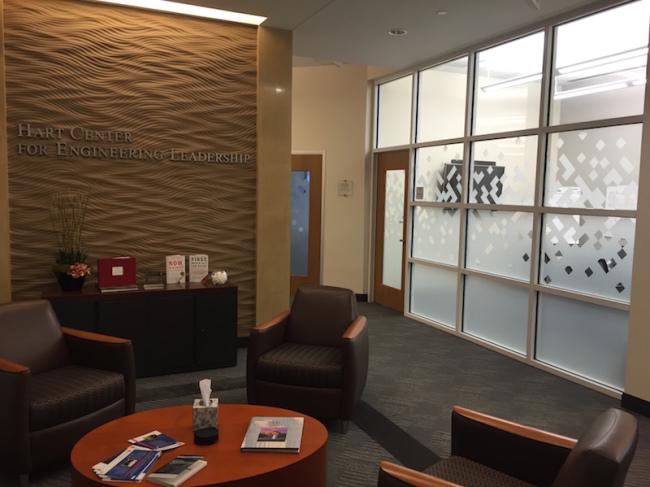Linda Perez, the director of career development at the Hart Center for Engineering Leadership, received a phone call one fall from the mother of a student in the cooperative education program at the SMU Lyle School of Engineering. The mother was calling about the tuition payment for the semester that her daughter would be working in the field rather than attending class.
“So I don’t have to pay for tuition?” Perez recalls her asking.
“Nope. Just send your daughter a care package and you’ll be good,” she said.

The cooperative education program, which is only available at SMU through the engineering school, gives students the opportunity to alternate between working full-time one semester and attending classes the next. There are typically about 30 to 40 students in the program at any time, and their tuition payments and scholarships are put on hold while they are getting paid to work full-time.
The opportunity is not only about its monetary benefit, say officials. Even though the program extends a student’s time as an undergraduate by a year in order to fit in time for work, students leave school with real experience under their belts. Co-ops help students dive right into real-world jobs and apply the knowledge they learn in the classroom.
What students learn on the job can support them once they return to the classroom. Angela Spevak, a transfer co-op student majoring in environmental engineering and mathematics, said that real world problems in class get easier after working in a co-op and that many professors stress the importance of understanding in-class problems that students might face in the real world.
“If you are in a job, you need to know about these things,” Spevak recalled one of her professors saying about the problems and scenarios they work through in class.
Perez said students like Spevak sign on with employers as early as the summer of their sophomore year. She helps students by reaching out to employers and bringing them on campus through career fairs, “grab-and-go” information sessions and casual recruitment events.
But many companies approach Lyle on their own accord. The line-up of employers that look to Lyle to fill positions is a long one, ranging from the NSA and Southwest Airlines to Texas Instruments and PepsiCo. Students in any engineering major, from civil engineering to environmental engineering, may be approached by these employers, who can search for students by specific fields of study.
One of the biggest differences between the co-op program and typical internships is the time spent on the job. Internships are typically offered in the summer and last about 10 weeks, Perez said. But a co-op job can last up to seven or eight months if a student decides to take the summer and fall semesters to work with a company.
Ryan Dudrow, a mechanical engineering and mathematics student who graduated last spring, knew before enrolling at SMU that he wanted to be in the co-op program.
Dudrow started his undergraduate co-op program at Freese and Nichols Inc., a full-service consulting firm, and took his second co-op term at PepsiCo, where he worked for 15 months. That is almost double the typical co-op term. But working with one company that long as an undergraduate had its perks.
“I figured out what type of field I wanted to enter into,” Dudrow said. Kicking around jobs during the program also helped him find out what he didn’t want to do, which was just as important.
Schools like Drexel University, where most majors require a co-op term, and the University of Cincinnati, where cooperative education originally started, have more robust programs. They extend their reach beyond engineering co-ops, and offer a wide range of opportunities for students outside of the sciences, including journalism and art students.
Drexel’s website features several students across all areas of study and highlights their co-op experiences. One photography major had the chance to work under professional photographers on the set of Saturday Night Live. Another student, a digital media major, took a co-op for graphic design and digital comics at Marvel Entertainment. So co-ops are not just grounded in engineering. Their availability varies from school to school and market to market.
The main reason Perez believes many engineering students don’t go through with a co-op is because they are turned off to adding an extra year to their undergraduate careers. Out of a room full of non co-op engineering students studying in the Altshuler Learning Enhancement Center, Rebecca Hill, a senior engineering student not in the co-op program, completely understands the benefits of doing a co-op despite the downside of graduating a year late.
“It’s a good opportunity that many students don’t take advantage of,” Hill said.
It is also a good opportunity for securing a post-graduate job according to Perez. The work experience is an attractive trait to many employers looking for new talent.
“Over the past seven years that I’ve been at SMU and involved with the co-op program, 100 percent of our students who are seeking jobs get jobs after graduation,” she said.
Spevak decided to try out the co-op program after hearing about them through two other students in Theta Tau, the engineering fraternity, and after meeting an employer through a past part-time job.
“Jobs are always in the back of my mind,” Spevak said.
Although she said she was “thrown into the fire” with the co-op program, Spevak believes that sticking it out leads to success and that jumping into a job through a co-op is never a bad decision.
“If you get an offer, what’s the worst that could happen?” she said.








